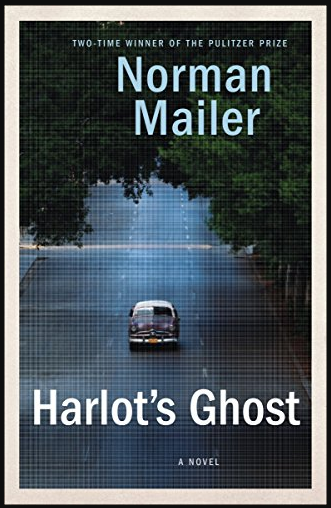Finished: August 2, 2023
Harlot's Ghost

I know that it is possible- even not uncommon - for a reader to forget the content of a book she has read a long time ago. But to forget that she has read the book entirely? This is my experience with "Harlot's Ghost". I could have sworn that I've never read this book, that I had bought a brand new paperback copy in the mid-nineties, put it on the shelf, and never read it.
It kept calling to me that paperback, "read me, read me", it seemed to be saying. You see I have a penchant to being attracted to very thick books, doorstoppers, I don't know why - hopefully it is something that other readers share and there is a name for it. Several pages into the book I noticed that some sentences were highlighted - it could only have been by me. Then I looked at the spine. Yes it was cracked. I head read this before, in my twenties. and had totally no recollection of it but one - a distressing scene at a German club. When I came across that I remembered it, but only that, the rest of the book felt like a first read to me. Upsetting thought: How many other books have I completely forgotten?
The paperback copy of "Harlot's Ghost" comes in at 1,100 pages and the hardbound book is at 1.300 pages. Having finished reading it, and comparing it with other "doorstoppers", I have to say that not only is "Harlot's Ghost" long but it is dense. In the time that I could read 30 pages of Dickens I would probably only manage 10 pages of "Harlot's Ghost", or maybe even less.
Even so, I finished it, it was worth finishing. But this statement deserves some qualification. Let me start by first saying that, in my opinion, Norman Mailer is a good writer, a formidable craftsman. Now, against that observation is another one: "Harlot's Ghost" is an interesting book, I read every chapter until the finish. But, but, I was not enthralled by it as I was by, say, "Lonesome Dove", another long book. With "Lonesome Dove", the story was so engaging that I was actually happy about the length of the book. With "Harlot's Ghost" I found myself counting the pages, I could not wait for the book to finish, but the story and the writing was strong enough to keep me reading until the end.
In "Harlot's Ghost" the reader steps into the shoes of Harry Hubbard, a CIA agent. We are with Hubbard from his youth to his early years with the Agency in the fifties and accompany him until the Kennedy assassination in 1963. On the way, the book "pops the hood" on the CIA. It is fascinating and different but this is, refreshingly, no glamour treatment of spycraft. Working for the CIA does remind me of holding a regular job. The book gives one a lot to think about regarding the Intelligence community - one thought that occurred to me several times while reading this book is: Is espionage really necessary or is it a monumental waste of time? The answer that I settled on is that it is necessary, unfortunately.
Before I get into the negatives of this book let me just stress the positives. First, the writing is top caliber except for just one thing that I'll go into later. Second, it is well-researched and detailed and those who come to this book wanting to learn about the CIA will not be disappointed.
Now for some of my critiques. First, there is a section here that goes into sixties personalities like Kennedy, Sinatra, the Clan (60's Brat Pack), Marilyn Monroe, and Sam Giancana. Mailer, who lived through those times, understandably has a very positive nostalgic opinion of those personalities - bordering on hero worship. A view that he fails to communicate. He seems to be assuming that the reader will feel the same way. I wasn't around during that decade so, to me, Kennedy et. al. are just a bunch of famous people. So the hero-worshipping tone of the narrative was a bit grating for me. I mean, what's Marilyn Monroe compared to Phoebe Cates and Brook Shields? Hahaha. To each generation, their heroes.
Another thing I want to note is that the writing, although top calibre, gave me an impression that there is a "barrier" between me, the reader, and the story. As if I was looking through a car window at events happening in the street. I could not engage with Harry Hubbard and the other characters in a level that allowed me to fully share their journey in the narrative. Something in the writing was preventing that.
In the end, I think the book was too long, but even though, it is worth the read because of the detailed treatment of the Central Intelligence Agency and Mailer's masterful prose.